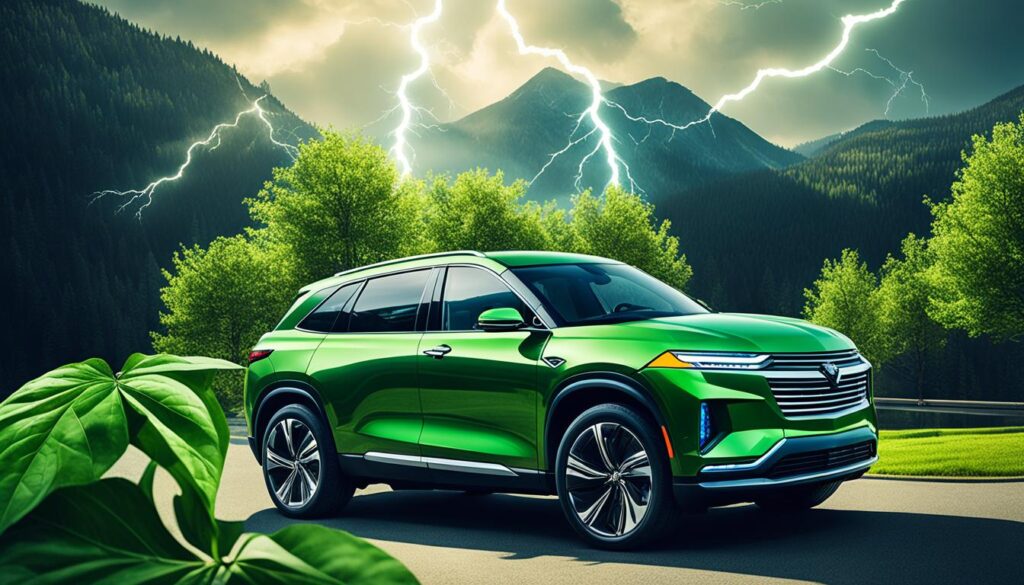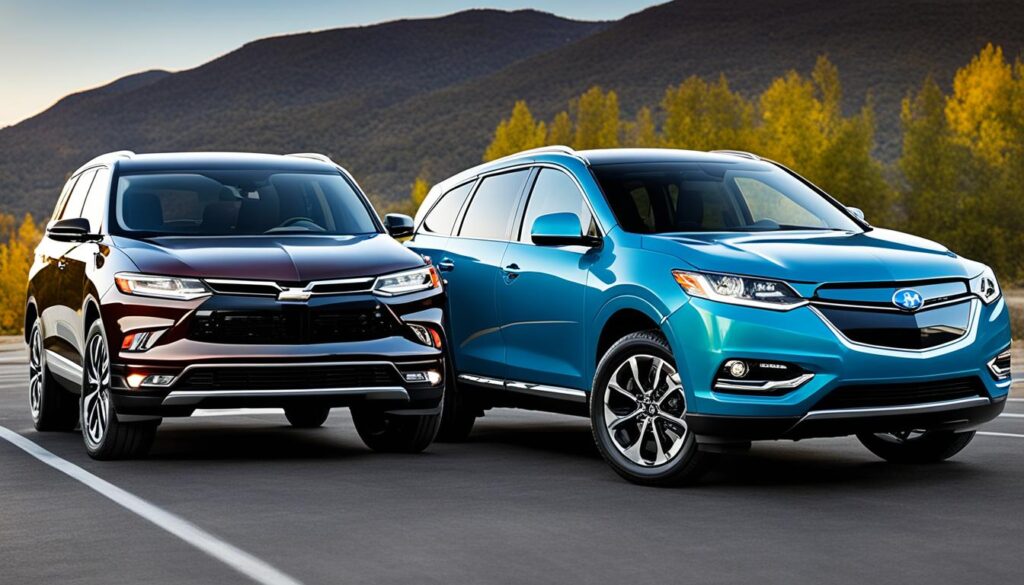The auto industry is moving fast towards more energy-efficient and eco-friendly cars. Choosing between a hybrid SUV and an electric SUV is a big decision. Each has its own benefits, but which one fits your driving needs and lifestyle best? This guide will look at the main differences, pros, and cons, and costs to help you decide.

Are you ready to start a journey towards a greener and more affordable driving life? Dive into the world of hybrid and electric SUVs. Find out which one suits your needs and preferences.
The Differences Between Hybrid and Electric SUVs
Hybrid and electric SUVs are great for eco-friendly driving. They have different powertrain technologies. This means they offer various benefits in engine performance, cost, and how they affect the environment.
Defining Hybrid SUVs
Hybrid SUVs mix traditional gas engines with electric motors. They have a main engine and one or more electric motors, all powered by a rechargeable battery. This setup helps them use less fuel and emit fewer pollutants than regular gas cars.
Hybrid SUVs come in two types: plug-in hybrid electric vehicles (PHEVs) and regular hybrids (HEVs). PHEVs can be charged from an outside power source. HEVs charge their batteries using the gas engine and brakes.
Defining Electric SUVs
Electric SUVs run only on electric motors and batteries, without a gas engine. They are better for the environment since they don’t emit pollutants and are cheaper to run. These cars use the latest in battery and motor tech for better performance and range.
Choosing between hybrid and electric SUVs depends on your driving habits, budget, and what you prefer. Both types offer green driving options for various needs in the family SUV market.

Pros and Cons of Hybrid SUVs
Hybrid SUVs bring together many benefits and some drawbacks. They are more affordable than fully electric SUVs but still pricier than traditional gas-powered ones. This makes them a good choice for many buyers.
Hybrid SUVs are also very flexible. They can switch between electric and gasoline power easily. This means owners can enjoy electric driving for short trips and have a backup for longer drives or unexpected needs.
- Hybrid SUVs have lower emissions than standard combustion vehicles, making them more environmentally friendly.
- Full hybrid vehicles offer better fuel economy than traditional gasoline engines and mild hybrids.
- Plug-in hybrid vehicles may be eligible for federal tax credits, potentially making them more cost-effective in the long run.
But, hybrid SUVs also have some downsides. They don’t produce as many emissions as traditional gas SUVs, but they still emit some greenhouse gases. They also need regular checks for both the gas engine and electric parts. Plus, they don’t have as much electric range as plug-in hybrids, which limits electric driving.
| Pros of Hybrid SUVs | Cons of Hybrid SUVs |
|---|---|
| Lower emissions than standard combustion vehicles | Still produce some greenhouse gas emissions |
| Better fuel economy than traditional gasoline engines | Require regular maintenance of both gas and electric components |
| Potential federal tax credits for plug-in hybrid models | Less all-electric driving range compared to plug-in hybrids |
| Increased flexibility with dual-power capabilities | Higher upfront cost than traditional gasoline-powered SUVs |
| More affordable upfront cost than fully electric SUVs | Lithium battery replacement can be expensive (up to $4,000) |
Hybrid SUVs are a good middle ground between electric and gas-powered vehicles. They offer eco-friendliness without the range issues or high costs of electric models. For those wanting a greener option without giving up too much, a hybrid SUV could be the right pick.

Pros and Cons of Electric SUVs
Electric SUVs have many benefits. They don’t produce direct emissions, making them eco-friendly. They are also quieter than cars with traditional engines, making for a peaceful ride. Plus, they have instant torque for quick acceleration and save on fuel and maintenance costs.
But, electric SUVs have their downsides. The limited charging spots can cause worry for drivers. They are also pricier upfront than traditional cars. And, the environmental impact depends on the electricity source, as power plant emissions can affect their eco-friendliness.
Charging Infrastructure and Range Anxiety
Charging stations are a big issue for electric SUVs. The U.S. has about 25,000 charging spots at 15,500 locations, but it’s not as easy as filling up at gas stations. This can make drivers anxious about running out of charge on the road.
Environmental Impact of Electric SUVs
The environmental effects of electric SUVs depend on the electricity source. They don’t emit directly, but power plant emissions can offset some benefits. Still, studies show they’re better for the environment than traditional cars, even with grid emissions. As renewable energy grows, electric SUVs will get even greener.
| Metric | Hybrid SUV | Electric SUV |
|---|---|---|
| Emissions (metric tons of CO2 annually) | 2.3 | 0 |
| Fuel Efficiency (miles per gallon) | 40-50 MPG | 70-100 MPGe |
| Maintenance Costs (average) | $162 | $133 |
Cost Comparison: Upfront and Ownership Costs
When looking at hybrid SUVs or electric SUVs, the initial cost and ongoing expenses are key. Electric SUVs often cost more at first than hybrids. But, they might be cheaper over time because of savings on fuel and maintenance.
Purchase Prices and Incentives
The average price of the top-ten best selling electric vehicles in the U.S. is about $53,758. The low-end versions average $48,430, and the high-end versions $64,936. In contrast, hybrid cars start at $33,214. Yet, electric SUVs can get up to $7,500 in federal, state, and local incentives and tax credits.
Fuel and Maintenance Costs
Electric SUVs are cheaper to run, with electricity costing less than gasoline. Fueling an electric car costs about $485 a year, much less than the $1,117 for a gas car. They also have lower maintenance costs because they have fewer parts.
Even with a higher upfront cost, electric SUVs can be cheaper over time. This is because of savings on fuel and maintenance. Driving habits, charging access, and personal choices will decide which is best for you.
| Metric | Electric SUV | Hybrid SUV |
|---|---|---|
| Average Purchase Price | $53,758 | $33,214 |
| Federal Incentives | Up to $7,500 | N/A |
| Annual Fuel Cost | $485 | $1,117 |
| Maintenance Costs | Lower | Higher |
Hybrid SUVs vs. Electric SUVs: Performance and Capability
Hybrid and electric SUVs are both great in terms of performance and capability. Hybrid SUVs use both an engine and an electric motor for power and efficiency. Electric SUVs, on the other hand, run only on electric motors for speed and quick starts.
Electric SUVs are ahead in power and speed. They get a boost from electric motor torque, making them fast and agile. This is great for city driving or quick moves.
But, hybrid SUVs are better for towing and off-road. They have a gas engine for extra power when you need it. This is perfect for those who need to haul heavy things or go off the beaten path.
So, both hybrid and electric SUVs perform well, and the choice depends on what you need and like. Whether you want fast starts or more power for towing and off-road, there’s a high-performance SUV for you.
Hybrid SUVs vs. Electric SUVs: Interior Space and Cargo Capacity
Hybrid and electric SUVs are similar in interior space and cargo capacity. They share the same vehicle platforms, leading to similar dimensions and seating. This makes them versatile for many needs.
The Toyota Highlander is a great example with its hybrid version. It’s a three-row SUV that can fit up to eight people. With the third-row seats down, it has almost 100 cubic feet of cargo space. It also has five USB ports for charging, perfect for families and adventurers.
Some electric SUVs, like the Volkswagen Atlas and Buick Enclave, even offer more space in the third row. The Hyundai Palisade and Kia Telluride are also known for their stylish and spacious interiors. These features can be important to some buyers.
| Model | Seating Capacity | Cargo Capacity (cu. ft.) | Third-Row Legroom (in.) |
|---|---|---|---|
| Toyota Highlander Hybrid | Up to 8 | Nearly 100 | 27.7 |
| Volkswagen Atlas | Up to 7 | 96.8 | 33.7 |
| Buick Enclave | Up to 7 | 97.6 | 33.5 |
| Hyundai Palisade | Up to 8 | 86.4 | 31.4 |
| Kia Telluride | Up to 8 | 87.0 | 31.4 |
In summary, both hybrid and electric SUVs have plenty of space for families and adventurers. The best choice depends on your lifestyle and what you need.
Evaluating Your Driving Needs and Lifestyle
Choosing between a hybrid SUV and an electric SUV requires looking at your driving habits and lifestyle. Think about your daily commute, charging options, long trips, and local incentives or tax credits.
If your daily drive is short and you have easy access to charging, an electric SUV might be right for you. These cars have no tailpipe emissions, are quiet, and save money since electricity is cheaper than gas. But, remember, electric SUVs can only go 200-300 miles on one charge, so plan ahead for long trips.
For those who often go on long drives or don’t have easy charging spots, a hybrid SUV could be better. Plug-in hybrid models offer a good mix of benefits, like tax breaks and less range anxiety. They have a battery that can be charged, giving you 20 to 40 miles of electric driving before switching to regular gas.
Make your choice based on what you need and what you like. Trying out both hybrid and electric SUVs can help you decide what fits your life best.
Conclusion
Choosing between hybrid and electric SUVs depends on what you need. Both have big advantages over traditional gas SUVs. Hybrid SUVs are cheaper upfront and have a gas engine for flexibility. Electric SUVs have zero emissions, save on fuel and maintenance, and offer a fun drive.
As technology gets better and charging spots grow, picking the right one gets trickier. Think about how you use your car, charging access, and long-term costs. This will help you pick the best for your life and wallet. Whether you want to cut emissions, save money, or do both, there are great options in hybrid and electric SUVs.
The choice between a hybrid and an electric SUV is up to you. It’s important to look at the good and bad of each to find what fits your needs and likes. As cars keep getting better, the differences between hybrids and electric models might get smaller. This means more choices for people who care about the planet.
You can also read

